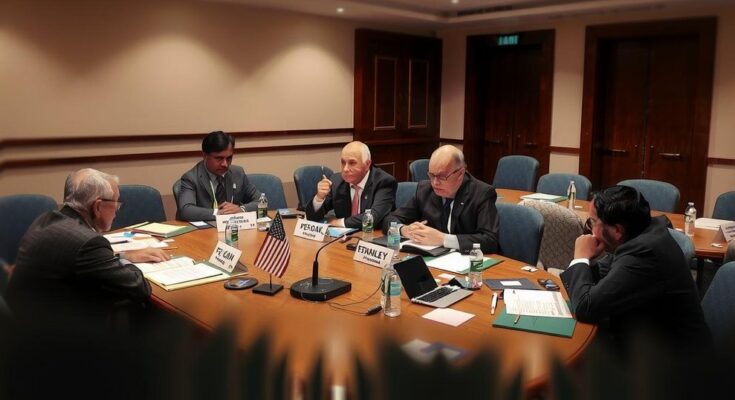The article highlights Bangladesh’s pivotal role in the International Court of Justice’s advisory opinion on climate change, addressing the responsibilities of states under international law to mitigate greenhouse gas emissions. It points to the challenges faced by vulnerable nations in securing binding commitments while emphasizing the importance of international cooperation. The impending ICJ opinion is viewed as crucial for clarifying legal obligations and promoting accountability among all states in combatting climate change.
The impact of climate change has become an urgent and contentious issue within the international legal sphere, particularly concerning the responsibilities of states. While nations most affected by climate change advocate for international cooperation and binding obligations, industrialized nations often exhibit reluctance to engage meaningfully. This divide has prompted vulnerable states to seek advisory opinions from international courts to clarify their rights and responsibilities regarding climate obligations.
The International Court of Justice (ICJ) distinguishes between contentious jurisdiction, which involves resolving disputes between states, and advisory jurisdiction, where it provides legal opinions at the request of competent entities, such as UN organs. Notably, while advisory opinions are not legally binding, they carry significant persuasive power.
Noteworthy examples include the International Tribunal for the Law of the Sea (ITLOS) providing an advisory opinion affirming that greenhouse gas emissions contribute to marine pollution and obligate states to mitigate such emissions in line with existing international law frameworks. Bangladesh, identified as one of the countries most affected by climate change, actively participated in these proceedings, emphasizing the urgency of addressing climate issues.
Bangladesh’s involvement in the request for an advisory opinion from the ICJ underscores its leadership role in international climate negotiations. As part of a coalition of states advocating for clarity on international climate obligations, Bangladesh participated in the oral proceedings, contributing its written perspectives and highlighting the disproportionate impacts of climate change on vulnerable nations despite their minimal contributions to global greenhouse gas emissions.
During the oral submission to the ICJ, Bangladesh’s representatives articulated the necessity of significant emissions reductions, particularly by developed nations, influencing discourse on global accountability for climate obligations. Bangladesh also stressed that international law should recognize the particular vulnerabilities of states like itself, thereby calling for enhanced financial support for climate adaptation and mitigation efforts.
The forthcoming ICJ advisory opinion is anticipated to be pivotal for international climate law, especially following the ITLOS ruling that emphasized state responsibilities. It is crucial for Bangladesh to continue aligning its domestic legal frameworks with its international commitments in order to effectively combat the realities of climate change.
The urgency for Bangladesh to harmonize its domestic laws with international legal standards is apparent, especially given its status among the top global greenhouse gas emitters. Participating actively in key international legal proceedings will fortify Bangladesh’s position and enhance its climate resilience efforts moving forward.
The engagement of nations like Bangladesh in global climate discussions signifies a critical step toward fostering accountability and collective action in the face of unprecedented environmental challenges.
The article discusses the complexities of international climate change obligations and the varying responses from states based on their vulnerability to climate impacts. It delineates the role of international courts, particularly the ICJ and ITLOS, in establishing legal benchmarks for state responsibilities concerning greenhouse gas emissions. Bangladesh’s active participation highlights the collective movement towards clarifying these obligations and underscores the urgent call for enhanced international cooperation to address climate change.
This analysis underscores the vital need for nations, particularly those most affected, to engage proactively in international legal frameworks that address climate change. Bangladesh’s involvement in the advisory opinions signifies a broader movement towards establishing clear responsibilities for all states and the necessity for developed nations to support vulnerable countries adequately. The anticipated advisory opinion from the ICJ could mark a significant advancement in international climate law and responsibilities, reinforcing the urgent need for collaborative action.
Original Source: www.newagebd.net




